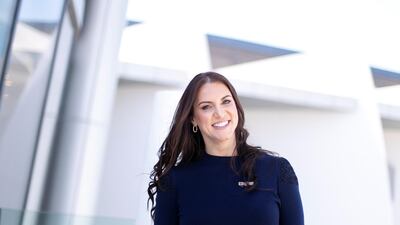Stephanie McMahon has spent most of her life around professional wrestling.
She is the daughter of WWE chairman and chief executive Vincent McMahon – a fourth-generation wrestling promoter. She is the chief brand officer of the company, but has also appeared on television as a wrestler and manager.
Over the years, McMahon, 43, has continued to be vocal about the need for morerepresentation, not only in the ring but in all areas of the wrestling industry. Recently, WWE hired its first woman in the role of general manager in Latin America and also brought in a woman as chief financial officer. While that's a start, she admits more work needs to be done.
When asked about the writers who put together the storylines, she says the company is still struggling for a more even playing field.
"We do not have enough. We do not have enough female writers in the writers' room, we are actively working on that.
“There is a dedicated focus to how we tell our women's storylines in the show, but we can always be better."
Pro wrestling used to largely be considered a male-dominated industry – from the fans to the talent and from writers to the stage crew. But McMahon says she's seen a transformation over the years, starting with the fan base.
“I’ve grown up in WWE so I have a bit of a different story than your typical executive, but I have seen our female fan base grow to now nearly 40 per cent,” she says. “I have seen little girls in our audiences wearing all the merchandise of our female superstars – and little boys, too, by the way. I’ve definitely seen a huge growth in our business.”
One reason for the increase in female fans is because more women wrestlers are getting opportunities to shine in the ring.
"Throughout the years, we've seen women's wrestling ebb and flow. In the Attitude Era, it was thought that our women were 'nice to have' not a 'need to have'. They weren't featured as main events, they were in various other roles," she says.
When once they competed in three-minute "squash matches" or were used in only managerial roles to male wrestlers, they now headline main events including, most notably, WWE's biggest annual show of the year, WrestleMania.
In 2019, Charlotte Flair, Becky Lynch and Ronda Rousey faced off against one another in a historic triple-threat main event match in front of 82,000 fans.
Wrestling buffs will already know that Flair and Lynch are part of The Four Horsewomen of WWE: the female take on The Four Horsemen wrestling stable of the 1980s and 1990s. They're joined by Sasha Banks and Bayley, and are viewed as leading the way in a groundbreaking era for women's wrestling.
This is something McMahon also credits her husband, Paul Levesque, for helping to bring about. He is responsible for the training and development of all WWE's future stars, as well as recruitment. Also known as Triple H, Levesque uses his knowledge of the business to help women wrestlers nurture their skills in the ring and on the microphone, but perhaps even more importantly, to train them in the same way as the men.
"He started recruiting elite female athletes, as well as men, and he started training the women the same as the men, giving them the same amount of match time on television at our live events," McMahon says. "These women, when given the opportunity, absolutely started to steal the show every time, [to the point] our fans started chanting 'this is wrestling' and 'women's wrestling'."
Even more notable over the past few years is how women wrestlers have started to be received internationally. Back in 2017, Banks and Alexa Bliss competed in the first women's match in Abu Dhabi. Only two years later, Natalya, and Lacey Evans, took part in the first women's match in Saudi Arabia.
"Our first women's match in Abu Dhabi took us six years to be able to have," McMahon says. "And during that match, the audience of both men and women started chanting 'this is hope', which is not your typical WWE chant.
"Then we had not one, but two women's matches in Saudi Arabia where the chant simply became 'this is awesome'. And that's really where we are today in terms of the evolution of women in our business and I couldn't be more proud of them, our fans and, of course, WWE."


